Jazz Jennings and Her Band of Cats Are the Definition of Trans Joy
The activist and artist grew up in the spotlight but stays grounded with the help of her fam — both human and feline.
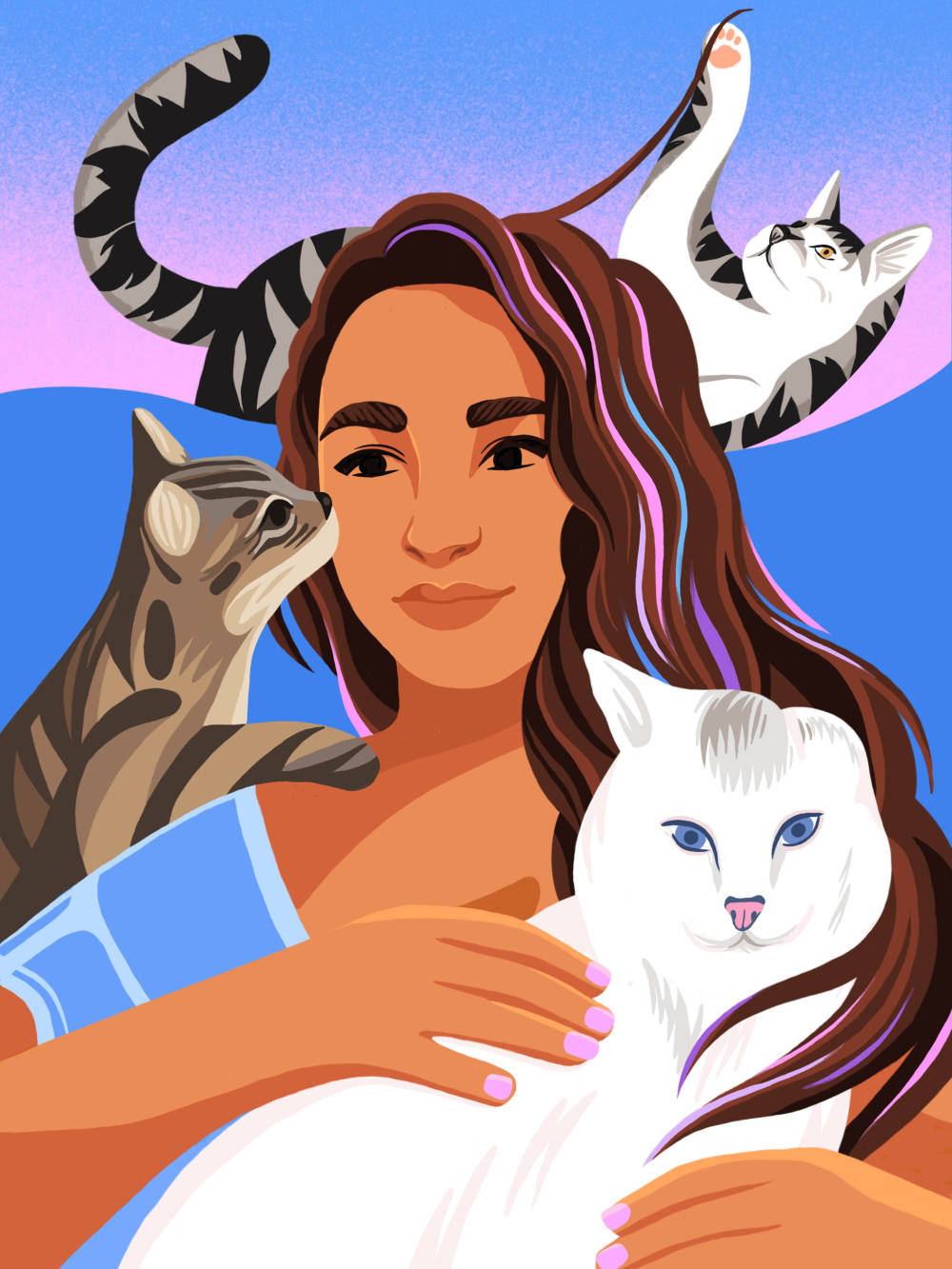
Share Article
To say that Jazz Jenningsopens in a new tab is a pioneer might be an understatement. In 2007, at the age of six, she first appeared on opens in a new tab with Barbara Walters to talk about being the one of the youngest publicly documented transgender people. After that, Jennings became a public figure. She did high-profile interviews, her family founded TransKids Purple Rainbow Foundationopens in a new tab to help other transgender youth, and in 2015, she starred in I Am Jazzopens in a new tab, a reality show about her and her family that currently airs on TLC.
In between all that, Jenningsopens in a new tab has written books, founded Purple Rainbow Tails to make mermaid tails (one of which was once featuredopens in a new tab at the Smithsonian National Museum of American History) to raise money for transgender youth, and has landed herself on several influential lists. The now 22-year-old adores her family, deals with mental health issues like many others of her generation, and is navigating a new challenge: college. Jennings currently attends Harvard University where she’s majoring in art, film, and visual studies. She has a close group of friends she considers to be “lifelong friends.” College has been a mind-opening experience, where she’s grown and learned more about who she is as an artist.
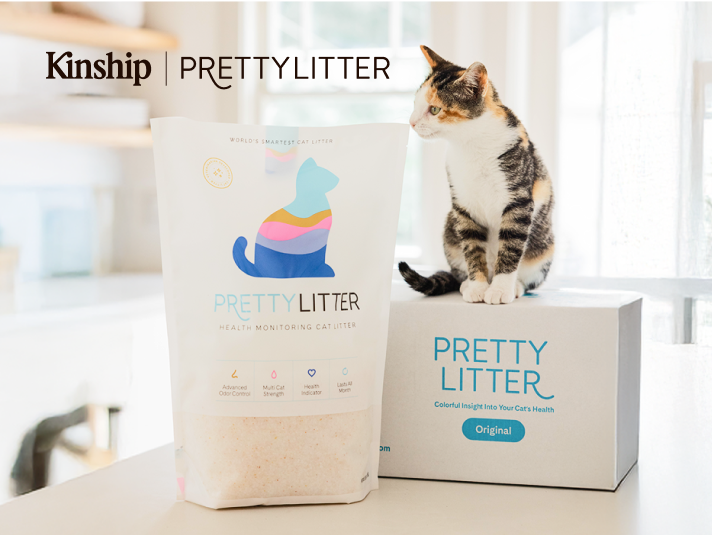
Save on the litter with color-changing tech that helps you better care for your cat.
While she’s going through a lot of change as a young woman, one constant for Jennings is her beloved gang of cats. Nemo, Luna, and Dunkin might live with her parents while she’s away for college, but they are never far from her mind. In fact, her main advice for anyone feeling depressed would be to “get a cat.” Jennings talks to Kinship about the origin stories of her cats, how they’ve helped her mental health, and why using her platform is so important.
I’d love to hear a little bit about how you got each of your cats.
Nemo is the oldest; we got him in the summer of 2013. He’s a white cat with one ear and blue eyes, and he was just a little kitten when we got him. We found him at an apartment complex construction site. There was a litter of kittens that were just born. And one of the cats was born with one ear and a crooked, demented mouth. He was actually rejected by his family because of the way he was born. We took him off the roof, and we rescued him and took him home. We actually named him Nemo because in the film Finding Nemo, Nemo has that little lucky fin.
The next cat we got was Luna, and that was in 2015. We lost one of our other cats because we let them run inside and outside. Not anymore. He went missing outside for a couple months, and then when we found him a few months later, he had kidney failure and liver failure. So, we had to put him down. Before we put him down, we didn’t know if we were ever going to find him. We got a new cat, Luna, and we went to the animal shelter, and she was just alone in a cage. She had the biggest, biggest eyes, and they reminded us of moons. So you know how Luna means moon? We named her Luna after her moon-like eyes.
And then our final cat, Dunkin, I got him for my 16th birthday. My parents found him on Craigslist, and they put him in a box that was wrapped in donut wrapping paper. So when they handed it to me, I thought it was a box of donuts. I’m like, “OK, I’m getting donuts for my birthday. That makes sense. I love donuts.” I opened the box, and there was a little kitten in there. We named him Dunkin after Dunkin Donuts.
How have you felt like your cats have affected your life?
They’re everything to me. I cuddle with them every single day. I would say I’m the main mother of the cats, but when I’m not home, my mom assumes that position. They’ve impacted my life so much because they’ve just taught me how to take care of another being. They just make me happy and bring me so much joy. Any time I’m depressed, they’re there as therapy, as companions. And I really do believe they are best friends.
Do any of the cats have specific, funny quirks that you really love about them?
They all have their little quirks and their little things. So, Luna, she’s like a squeaky toy. When she jumps off a bed, she’ll go, “Prrrp.” You’ll hear her squeak almost, and she’s just adorable. She’ll just take her big eyes and look at you and give you puppy dog eyes...well, no, not kitty cat eyes. Dunkin is really talkative. He never stops meowing, and he always hangs out in the one room, the family room, that’s his room. In the middle of the night sometimes he wakes me up because he’s so loud. On the other hand, Nemo has the softest little meow. He’s so mushy with his expressions. He’s just so soft, gentle, and very adorable.
How’s it been documenting your life since 2015 on I Am Jazz? Are you going to continue this in other formats, and why does going that route feel impactful for you?
It’s definitely changed my life being able to tell my story on a major platform. And it’s also changed the lives of so many other people. Our initial intention for doing the show was to raise awareness and visibility for trans people, help people better understand what it means to be trans, and that we’re all just human beings trying to find acceptance and peace in this world. Beyond the show, I hope to continue using my platform to make a difference and create change and just create a more loving society, because at the end of the day, it’s all about love and acceptance and everyone just celebrating each other and embracing our uniqueness and who we are.
What does the TransKids Purple Rainbow Foundation do?
The TransKids Purple Rainbow Foundation iopens in a new tabs our family foundation that was established back in 2007 after my first television appearance on 20/20 with Barbara Walters. The foundation raises money to support transgender and gender nonconforming youth and families. Amongst some of the things we do, we hold parties where trans kids get to meet other kids like themselves. There’s also camps where all of the campers are LGBTQ+. We’ll send kids to camp and provide scholarships for them to be able to attend these camps that are really life changing.
There are so many ridiculous book bans that are happening around the country. What’s it like to know that your book I Am Jazz is in some of those bans?
I don’t know why people think the book opens in a new tabis so harmful when it’s all about promoting acceptance and equality. The book’s intention is to help promote diversity and inclusion and to allow all kids to know that it’s OK to be different. So many families and kids have come up to me saying that the book has allowed them to learn about their identity and allowed them to open up to who they are.
I think people are afraid of what they don’t know or understand and so many people are afraid the book will brainwash kids. But that’s never been the case. It’s always been about allowing kids to just be their true, authentic selves. I don’t think any book should be bannedopens in a new tab, but this book, especially a children’s book. Taking it away only hurts people.
There’s so much scary anti-trans legislation happening right now. How can allies help at this crucial moment?
Allies are the core of our community. In order for us to be able to thrive as our authentic selves, we need allies to support and accept us. I challenge all allies to not remain silent and to speak out. Use your platform, use your voice to help promote equality and inclusion in this world.
My brother [Sander], he goes above and beyond as an ally; he is so passionate about changing the world, and he not only loves me, he loves all trans people and all LGBTQIA+ people. He uses his privilege as a cis heterosexual male to help create a better world. I would advise all allies to follow in his footsteps, maybe follow him on social mediaopens in a new tab, and see how he does itopens in a new tab and apply that in their own way. Allies, they are the core; we need their acceptance in order for us to be able to be ourselves.
On the flip side, you also want to see the community find joy despite everything happening. Can you talk about your relationship with mermaids and why you made — or if you still make — the mermaid tails for other trans kids?
I’ve always loved mermaids. It’s really interesting because a lot of trans people gravitate towards mermaids. It’s some innate thing because [mermaids] don’t actually have genitalia. As a kid, I didn’t realize that, but I was just naturally drawn to them. But later, it’s like, “Oh, wow, that’s so interesting.”
I’m actually in the room in my house right now where I make mermaid tails, and I have a mermaid tail in progress. I don’t currently make tails for people anymore because that was a lot: going to school, being a kid, and trying to run a business. My room used to be themed mermaids until I recently changed it, but I’ve always been passionate about mermaids.
Besides using your platform to give visibility to the trans community, you’re also been really open about mental health, especially around issues of body image and having a healthy relationship with food. Why is it important for you to examine that?
My weight gain was really obvious to a lot of people, and I felt it was important that I shared why I looked different. And it was because I do struggle with binge eating disorder. But I have been working on those habits. I work with professionals who help me with my binge-eating disorder. I’ve actually been working on my health a lot, and I’ve lost about 50 pounds. So, I’m doing good, but I still want to lose more weight, and I still have to continue improving my habits.
The main reason why I share my mental health issues and my binge-eating issues is because I want people to be able to resonate and be like, “I struggle with that, too. And to see Jazz, even though she struggles with that, she can still thrive and do amazing things and be successful. I can do that as well.” I just want people to be able to relate to me and understand that I am human, and we’re all human, and life is hard, and there’s so many challenges we all face, and whether it be an eating disorder or struggling with anxiety or depression, we all go through it.
It’s also hard sometimes because a lot of people associate my mental health issues with me being transgender. And I’ve reiterated over and over again that is not the case. My anxiety and my depression is just something innate, and it has nothing to do with my trans identity.
How do you feel like your cats have helped with your mental health?
Cats are like therapy. The cat will just come into [my] room and go, “Prrrp.” [I’ll] be like, “Oh, my God, I’m so happy now; come here.” And the cat will jump on the bed, and we’ll have a snuggle session and everything is OK. I love my babies so much, and they always bring me joy even when I feel depressed.
How have you felt like media depictions of trans people have shifted in the last decade?
I remember when I was younger, Laverne Cox being on the cover of Time and being in Orange is the New Black, that was a huge thing. Now, there are so many trans characters on television. There are so many trans voices being shared through social media. I’m happy to see that the trans community is more visible than ever before. And I just wish the acceptance for the trans community also was better than it ever was. But I don’t know if that’s the case because there [are] so many people who don’t understand or who are still hateful or just cruel. You would think that the more visible the trans community is, the more people would be like, “OK, I’m understanding this.” But, I do think it has shifted a lot.
What’s the thing you hope everyone remembers during this particularly challenging moment for trans folks in this country?
Why is everyone so stuck on trans issues? We should be focusing more on climate change and other big issues that are going to affect all of us. I think everyone has to love everybody, and we have to stop attacking each other and start respecting each other and realize that you can’t force someone to be something that they’re not. The trans community is going to always exist, we’re always going to be ourselves, and nothing can stop us, and we don’t care what anyone has to say.

Kerensa Cadenas
Kerensa Cadenas is a writer based in New York. She’s previously worked at The Cut, Thrillist, Cosmopolitan, and Complex. Her work has been featured in Vulture, GQ, Vanity Fair, and others.
Related articles
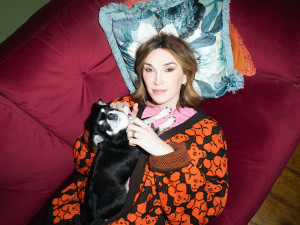 opens in a new tab
opens in a new tabJuno Dawson and Her Dog Prince Think You Need to Chill
The author of the ninth-most banned book in the US finds joy in creating queer art and basking in the unconditional love of her Chihuahua.
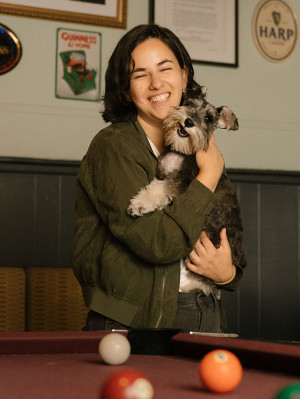 opens in a new tab
opens in a new tabErica Rose and Her Dog Patty Mayonnaise Have the “Chutzpah” to Save Lesbian Bars
The co-creator of the Lesbian Bar Project shares her hopes for the future of queer filmmaking and her dog’s star status.
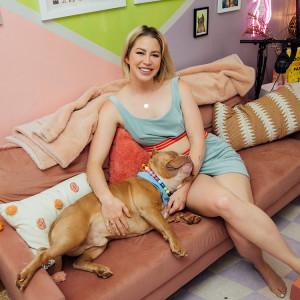 opens in a new tab
opens in a new tabKelsey Darragh’s Pit Bull, Hippo, Is Her True Soulmate
The filmmaker, comedian, and mental health advocate’s boyfriend didn’t want to adopt their foster pup. She ditched the guy and kept the dog.
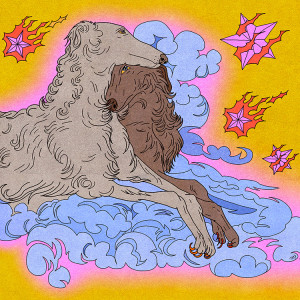 opens in a new tab
opens in a new tabHow I Built My Queer Family One Pet at a Time
My life looks nothing like I imagined growing up—but it’s perfectly complete.
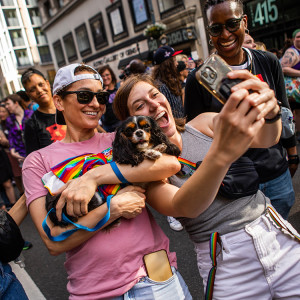 opens in a new tab
opens in a new tabThe 2023 NYC Dyke March Was Full of Prideful Pups
The day before the city’s annual Pride March, queer and trans folks (and their pups) gathered for the 31st annual Dyke March.